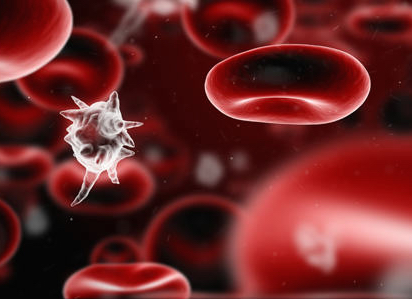Non-neutralising adrenomedullin antibody adrecizumab (HAM8101) in septic shock patients

The AdrenOSS-2 phase 2a biomarker-guided trial
In septic shock, the impairment of the endothelial barrier plays a pivotal role in establishing abnormalities in circulation and cellular metabolism, resulting in hyperpermeability and oedema. The development of the damage and the barrier stability is modulated – among the others – by adrenomedullin (ADM).
Plasma levels of bioactive ADM (bio-ADM) are elevated in sepsis patients prone to developing septic shock, and it is associated with severe multiple organ dysfunction and increased mortality risk. Adrecizumab is a high-affinity, non-neutralising monoclonal anti-ADM antibody, which has been demonstrated to improve endothelial homeostasis, organ function and survival in pre-clinical models.
The AdrenOSS-2 is a multicenter, randomised, double-blind, placebo-controlled trial using bio-ADM-guided enrichment and therapy with adrecizumab in early septic shock patients [1].
Adult patients at the early phase of septic shock (defined as the duration of vasopressor therapy for less than 12 hours before inclusion), matching the inclusion criteria, were enrolled. The main inclusion criteria was elevated bio-ADM levels (> 70 pg/mL).
From December 2017 to September 2019, 459 patients were screened and 301 were randomised in a 1:1:2 ratio to placebo (n = 152), 2 mg/kg (n = 72) or 4 mg/kg adrecizumab (n = 77).
The primary outcomes, safety and tolerability, were achieved as similar results were obtained in the treatment (both 2 and 4mg/kg) and placebo groups. Concerning safety, 284 patients out of 301 (97.3%) experienced at least one treatment-emergent adverse event (TEAE), among which TEAEs of grade 3 or higher occurred in 105/149 (70.5%) vs 108/152 (71.1%) patients in the combined adrecizumab and placebo group, respectively. Reported TEAEs related to the drug administration were 12 (8.3%) in the combined treatment group and 13 (8.6%) in the placebo group. Survival at day 90 was similar.
Regarding tolerability, comparable arterial pressure or heart rate changes were seen between adrecizumab combined or placebo groups. Only one patient (4mg/kg group) had the infusion prematurely stopped.
Secondary outcomes were clinical efficacy and pharmacokinetics of adrecizumab.
Considering efficacy, Sepsis Support Index (SSI) was below 14 in 60.3% vs 58.9% in treatment and placebo arms, respectively, with no significant differences in the separate components (respiratory, cardiac and renal, as well as mortality) at both 14 days and 28 days of follow-up. The delta Sequential Organ Failure Assessment (SOFA) score (defined as maximum minus minimum SOFA during the first 6 days) was higher in the adrecizumab combined group compared to placebo [4.05(2.41) vs 3.29(2.56), respectively] with a difference in the delta between the two groups of 0.76 (95% CI 0.18–1.35); p = 0.007 (available in only n = 280 due to missing data).
The 28-day mortality was 23.9% and 27.7% in the adrecizumab combined and placebo groups, with the unadjusted HR (95% CI) of 0.84 [0.53–1.31], log-rank p = 0.44 for adrecizumab combined. Exploratory interaction analysis for 28-day mortality did not show the need for stratification based on bio-ADM levels or severity scores. There were no significant differences in the mean duration of vasopressor therapy and average fluid balance. Concerning quality-of-life assessment, change of the Visual Analogue Scale (VAS) from ICU discharge to 90-day follow-up was not significant [16.5 ± 22.5 in the adrecizumab group vs 7.6 ± 27.5 in the placebo group (difference of 8.9 (95% CI 0.2–17.6); p = 0.052].
In the nested pharmacokinetic sub-study (n = 53), the mean peak plasma concentrations (Cmax) for free adrecizumab was lower in patients treated with 2 mg/kg (38.2 µg/mL, ± 10.4) than in 4 mg/kg group (86.9 µg/mL ± 22.2). Terminal half-life was similar in the two adrecizumab-treated groups (206 ± 44 vs 178±44 hours, respectively). It is hypothesised that the increased levels of circulating bio-ADM – confirmed by the increased level of circulating adrecizumab – might be caused by
(a) the redistribution from the interstitium towards the vessels and
(b) the reduction of proteolytic degradation of plasmatic bio-ADM.
This is thought to enhance the bio-ADM activity, with beneficial effects on the endothelium and limited adverse effects on the vascular smooth cells.
De novo synthesis is excluded by a stable level of circulating MR-bio-ADM.
STUDY STRENGTHS & LIMITATIONS
Strengths
- The therapy was initiated within the first 12h after detection of septic shock, a time span found to be decisive for initiation of a specific treatment.
- AdrenOSS-2 demonstrated that the novel trial design with a personalised approach applying a pathway-related biomarker is doable, even in the ICU settings.
Limitations
- Secondary endpoints were not adjusted for multiple testing; therefore, some results may have become significant by chance, and results need replication/confirmation.
- There were missing data concerning the significant difference in delta SOFA score.
- The lack of power to detect clinically important differences or to define dose response.
TAKE-HOME MESSAGES
AdrenOSS-2 demonstrated that adrecizumab has a safe and well-tolerated profile. In addition, the antibody increases the levels of circulating bio-ADM, which plays a regulatory role in preserving the endothelial barrier function. Efficacy outcomes need to be further investigated in future trials.
This article review was prepared and submitted by Dr Claudia Stella and Dr Temistocle Taccheri, Fondazione Policlinico Universitario “Agostino Gemelli” IRCCS, Rome (Italy), on behalf of ESICM Review Club.
REFERENCES
Geven C. et al. A double-blind, placebo-controlled, randomised, multicentre, proof-of-concept and dose-finding phase II clinical trial to investigate the safety, tolerability and efficacy of adrecizumab in patients with septic shock and elevated adrenomedullin concentration (AdrenOSS-2). BMJ Open. 2019 Feb 19;9(2):e024475. PMID: 30782906; PMCID: PMC6377571.
Laterre P.F. et al. Safety and tolerability of non-neutralizing adrenomedullin antibody adrecizumab (HAM8101) in septic shock patients: the AdrenOSS-2 phase 2a biomarker-guided trial. Intensive Care Med. 2021 Nov;47(11):1284-1294. https://doi.org/10.1007/s00134-021-06537-5. PMID: 34605947; PMCID: PMC8487806.